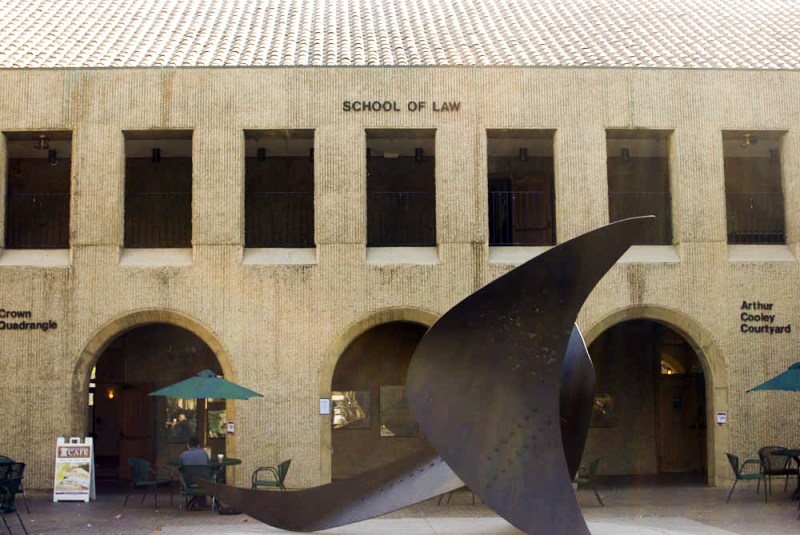History professor Robert Proctor drew backlash after repeatedly saying the N-word — when quoting from advertisements — in a guest lecture for Stanford Law School (SLS) professor John Donohue’s torts law class shortly before Thanksgiving Break.
Proctor “should understand the harm caused by using the N-word and how the word is used to oppress and marginalize,” stated a letter to members of the law school community from groups including the Black Law Students Association (BLSA). “Professor Proctor’s use of the N-word did not have pedagogical value — repeating this word was not germane to the subject of the presentation (the tort liability of the tobacco industry).”
The letter said that 44 of 60 students present during the class signed a letter expressing “shock and disappointment” to SLS Associate Dean of Student Affairs Jory Steele. The incident was first reported by campus newsletter the Fountain Hopper.
Proctor told The Daily that in his lecture, he aimed to demonstrate the “racialist marketing” used by the tobacco industry. His slides — one of which was labeled “Racist brands” — included images of the N-word’s use in brand names, according to slides provided to The Daily.
“I didn’t ‘use’ the N-word in my lecture, I showed and cited its use in three different brands of cigarettes sold in the middle decades of the twentieth century,” he wrote in an email to The Daily. He acknowledged that he named brands whose names included the N-word.
The letter from law school groups said that their intention was not to suppress discussion or cause uncomfortable topics to be avoided.
“But some lines can, and should, be drawn,” the message stated. “We do not need to use the N-word to have substantive conversations about how the law impacts Black people and other marginalized communities.”
The letter also criticized Donohue for not intervening in the lecture, and said that he “sidelined” some students’ attempts to discuss the use of the slur with Proctor. In an email to students in the class, he apologized “for any hurt caused by Dr. Proctor’s reference to the racist history” of tobacco industry advertising.
“This opening reframed the source of student discomfort — suggesting students objected to discussing a sensitive topic, rather than the repeated use of a racial slur in the course of that discussion,” the letter from student groups said.
Donohue did not respond to multiple requests for comment.
In his letter, he wrote that he spoke with a number of faculty members about the incident and received an “array of different opinions.” While one faculty member agreed with students who felt Proctor’s use of term was inappropriate, others shared opposing views. Among them, Donohue wrote, was that “the battles against injustice are so intense and ugly that lawyers in particular need to withstand and ignore at least some types of verbal unpleasantness in order to keep the focus on the greater social evils.” Another faculty member said that “criticisms of comments similar in nature to those made by Dr. Proctor give enormous fuel to the Fox News crowd that helped elect Donald Trump,” Donohue wrote.
Donohue did not indicate which of the views included in his email he agreed with, but said had he known Proctor would “show and comment on the racist slide,” he “would have counseled him against it.”
The letter from student groups called on faculty to acknowledge demands brought up by students during the “Racism Lives Here Too” movement in 2018, including faculty participation in workshops on diversity and inclusion, and asked for SLS administrators to condemn the incident.
SLS Dean Jenny Martinez apologized for the incident in a letter to the SLS community.
“The law school is committed to creating an inclusive environment where all students can thrive,” Martinez wrote. “As a school, we still have a lot of work to do.”
While noting that primary sources may include racist content, Martinez wrote that speaking racial epithets aloud “rarely adds substantive content to the class even when the purpose is to condemn the epithet.”
“Context matters, but knowing that such hateful words are likely to have a disproportionate effect on certain students in the class,” Martinez added, “it is rare that there is an incremental educational value in speaking them out loud that outweighs the distress it causes.”
SLS Director for Media Strategy Stephanie Ashe responded on behalf of Steele with the letter from Martinez.
This article has been updated to include that one of Proctor’s slides was labeled as “Racist brands,” according to slides provided to The Daily.
Contact Ella Booker at ebooker ‘at’ stanford.edu.
